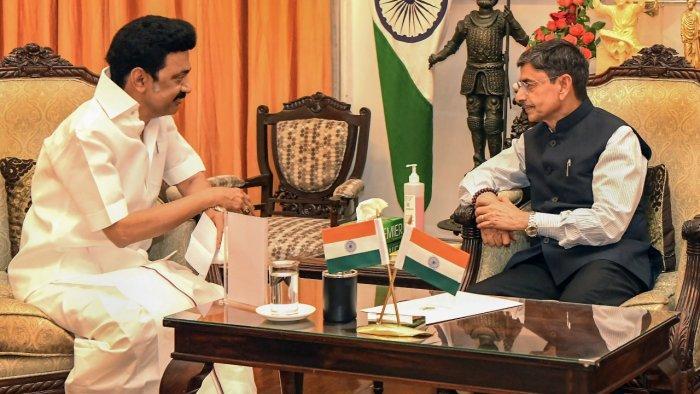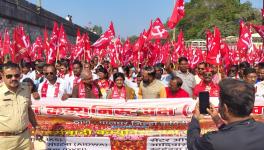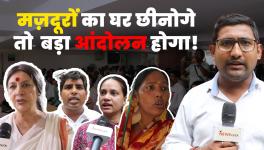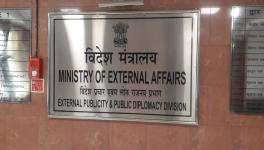DMK Accuses Governor of Obstructing Bills, Acting Against Constitution

The ties between the Dravida Munnetra Kazhagam (DMK) government and Governor RN Ravi are waning. The ruling front, including Chief Minister MK Stalin and his cabinet members, boycotted the 'in house reception' hosted by the Governor on April 14.
The DMK and its allies accused the Governor of not discharging his constitutional duties by sitting on the bills passed by the legislature. The DMK has demanded that the Governor resign or be recalled by the Union government. DMK MPs have raised this issue in both houses of the parliament.
In his response to the Assembly during the budget session, the finance minister of the State government has said that 19 bills are pending with the Governor, President and the Union government, resulting in administrative inconveniences.
The delay from the Governor's office on bills passed by the state legislature was taken up in both houses of the parliament by the DMK MPs. Once again, the National Eligibility cum Entrance Test (NEET) has become the point of contention.
The DMK as a political party is against the idea of appointing governors to the state, with the view of the governor's office being used as an instrument to control state governments.
RULING FRONT BOYCOTT RECEPTION
On April 13, the Communist Party of India (Marxist) [CPI(M)] Tamil Nadu unit announced the boycott of the ‘in house reception’ scheduled on April 14 hosted at the Raj Bhavan. This was followed by DMK, Congress, Communist Party of India, Viduthalai Chiruthaigal Katchi (VCK) and other allies of the ruling front.
“The Governor is acting as a power centre by rejecting the decisions of the government elected by the people. By delaying action on the bills, the office of the Governor is undermining the state legislature,” the party said in a statement.
Two ministers in the cabinet met the Governor on April 14 to discuss the status of the bill seeking exemption from NEET. The 45 minutes long meeting concluded without any assurance from the Governor on forwarding it for the President’s assent.
After the ruling front boycotted the reception, the representatives of All India Anna Dravida Munnetra Kazhagam (AIADMK), Bharatiya Janata Party (BJP) and Tamil Maanila Congress (TMC) attended.
‘GUV’S ACTION UNCONSTITUTIONAL’
In his response to a discussion in the state assembly, the finance minister PTR Palanivel Thiyagarajan said that 19 bills sent by the state government are pending with the Governor, President and the Union government. The minister also questioned the delay leading to the hurdles in executing the welfare measures.
A Saravanan, the spokesperson of the DMK, accused the Governor of acting against the constitutional framework. "What the Governor is doing is illegal and unconstitutional. He cannot act as a super chief minister by delaying the recommendations of the government to which the Governor is bound by," he said.
The party has also accused the Governor of delaying several other bills as well, including the amendments to the Cooperative Societies Act, the formation of the Siddha University Act and amendments to the Bharathiar University Act.
"The only work of the Governor is to provide assent and forward bills to the President for assent. If he is not discharging his only duty, why should he stay in office?" Saravanan questioned.
"The Governor takes the oath to protect, preserve and defend the constitution, together with devoting time for the development of Tamil Nadu. But, his actions prove otherwise. The Governor is blatantly acting against the constitution," he further said.
The actions of governors in states like West Bengal, Kerala and the union territory of Puducherry have been highlighted as the intervention of the BJP-led union government in affairs of the state.
“The governors are bound by the aid and advice of the elected governments as per Article 163. But, that is also being violated,” Saravanan said.
ISSUE RAISED IN PARLIAMENT
The issue of the inaction of the Governor was raised in both houses of the parliament by the DMK MPs earlier in April, a few days after the chief minister MK Stalin reminded the Governor of the delay in sending the anti-NEET bill to the President.
The CM met the Governor and urged him to forward the bill for President's assent, while the Raj Bhavan had promised to send the bill as soon as possible on March 15. Two weeks later, the CM accused the Governor of intentionally delaying the re-adopted anti-NEET bill, which escalated the tension between the Governor and the government.
On April 1, DMK's Rajya Sabha MP, P Wilson, moved a private member bill to amend Article 200 of the constitution. The MP sought to fix two months as the time limit for acting on the bills formulated by the governments. In the Lok Sabha, the leader of the DMK, TR Baalu submitted a calling attention motion on April 5 against the inaction of the Governor, which was denied permission, leading to the DMK MP walking out.
The DMK’s mouthpiece Murasoli, once again accused the Governor for delaying the bills. The editorial accused the Governor of acting like the President and playing politics. The state legislature passed the bill seeking exemption from NEET, for the second time on February 8 and was sent for approval the next day.
Once again, the heads of constitutional and administrative offices of the state are colliding on issues pertaining to the interest of the people, leading to conflicts. The BJP led union government has been repeatedly accused of using the governors’ office as a hurdle for non-BJP ruled states.
The ties between the Dravida Munnetra Kazhagam (DMK) government and Governor RN Ravi are waning. The ruling front, including Chief Minister MK Stalin and his cabinet members, boycotted the 'in house reception' hosted by the Governor on April 14.
The DMK and its allies accused the Governor of not discharging his constitutional duties by sitting on the bills passed by the legislature. The DMK has demanded that the Governor resign or be recalled by the Union government. DMK MPs have raised this issue in both houses of the parliament.
In his response to the Assembly during the budget session, the finance minister of the State government has said that 19 bills are pending with the Governor, President and the Union government, resulting in administrative inconveniences.
The delay from the Governor's office on bills passed by the state legislature was taken up in both houses of the parliament by the DMK MPs. Once again, the National Eligibility cum Entrance Test (NEET) has become the point of contention.
The DMK as a political party is against the idea of appointing governors to the state, with the view of the governor's office being used as an instrument to control state governments.
RULING FRONT BOYCOTT RECEPTION
On April 13, the Communist Party of India (Marxist) [CPI(M)] Tamil Nadu unit announced the boycott of the ‘in house reception’ scheduled on April 14 hosted at the Raj Bhavan. This was followed by DMK, Congress, Communist Party of India, Viduthalai Chiruthaigal Katchi (VCK) and other allies of the ruling front.
“The Governor is acting as a power centre by rejecting the decisions of the government elected by the people. By delaying action on the bills, the office of the Governor is undermining the state legislature,” the party said in a statement.
Two ministers in the cabinet met the Governor on April 14 to discuss the status of the bill seeking exemption from NEET. The 45 minutes long meeting concluded without any assurance from the Governor on forwarding it for the President’s assent.
After the ruling front boycotted the reception, the representatives of All India Anna Dravida Munnetra Kazhagam (AIADMK), Bharatiya Janata Party (BJP) and Tamil Maanila Congress (TMC) attended.
‘GUV’S ACTION UNCONSTITUTIONAL’
In his response to a discussion in the state assembly, the finance minister PTR Palanivel Thiyagarajan said that 19 bills sent by the state government are pending with the Governor, President and the Union government. The minister also questioned the delay leading to the hurdles in executing the welfare measures.
A Saravanan, the spokesperson of the DMK, accused the Governor of acting against the constitutional framework. "What the Governor is doing is illegal and unconstitutional. He cannot act as a super chief minister by delaying the recommendations of the government to which the Governor is bound by," he said.
The party has also accused the Governor of delaying several other bills as well, including the amendments to the Cooperative Societies Act, the formation of the Siddha University Act and amendments to the Bharathiar University Act.
"The only work of the Governor is to provide assent and forward bills to the President for assent. If he is not discharging his only duty, why should he stay in office?" Saravanan questioned.
"The Governor takes the oath to protect, preserve and defend the constitution, together with devoting time for the development of Tamil Nadu. But, his actions prove otherwise. The Governor is blatantly acting against the constitution," he further said.
The actions of governors in states like West Bengal, Kerala and the union territory of Puducherry have been highlighted as the intervention of the BJP-led union government in affairs of the state.
“The governors are bound by the aid and advice of the elected governments as per Article 163. But, that is also being violated,” Saravanan said.
ISSUE RAISED IN PARLIAMENT
The issue of the inaction of the Governor was raised in both houses of the parliament by the DMK MPs earlier in April, a few days after the chief minister MK Stalin reminded the Governor of the delay in sending the anti-NEET bill to the President.
The CM met the Governor and urged him to forward the bill for President's assent, while the Raj Bhavan had promised to send the bill as soon as possible on March 15. Two weeks later, the CM accused the Governor of intentionally delaying the re-adopted anti-NEET bill, which escalated the tension between the Governor and the government.
On April 1, DMK's Rajya Sabha MP, P Wilson, moved a private member bill to amend Article 200 of the constitution. The MP sought to fix two months as the time limit for acting on the bills formulated by the governments. In the Lok Sabha, the leader of the DMK, TR Baalu submitted a calling attention motion on April 5 against the inaction of the Governor, which was denied permission, leading to the DMK MP walking out.
The DMK’s mouthpiece Murasoli, once again accused the Governor for delaying the bills. The editorial accused the Governor of acting like the President and playing politics. The state legislature passed the bill seeking exemption from NEET, for the second time on February 8 and was sent for approval the next day.
Once again, the heads of constitutional and administrative offices of the state are colliding on issues pertaining to the interest of the people, leading to conflicts. The BJP led union government has been repeatedly accused of using the governors’ office as a hurdle for non-BJP ruled states.
Get the latest reports & analysis with people's perspective on Protests, movements & deep analytical videos, discussions of the current affairs in your Telegram app. Subscribe to NewsClick's Telegram channel & get Real-Time updates on stories, as they get published on our website.
























